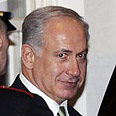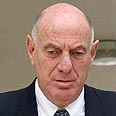
Netanyhau on way out of White House
Photo: AP

'Time will tell.' Weisglass
Photo: Shaul Golan
Attorney Dov Weisglass said the fact that reporters were not allowed in the Oval Office during Monday night's meeting between Prime Minister Benjamin Netanyahu and President Barack Obama, as well as cancellation of a briefing the Israeli leader intended to hold for reporters, was indicative of either a crisis or far-reaching understandings regarding the Mideast peace process.
Washington Talks
Yitzhak Benhorin, Reuters
White House meeting fails to provide any sign of progress toward jumpstarting stalled Israeli-Palestinian peace talks; PM cancels scheduled briefing for reporters. Barak to CNN: All options on table regarding Iran
"A nearly two-hour meeting between the prime minister and the president of the United States is certainly a special event. It does not happen every day, and it was held behind closed doors because of its content," said Weisglass, who served as former Prime Minister Ariel Sharon's bureau chief.
"Clearly, one of two things occurred during the meeting – a severe crisis and deadlock which the sides do not want to make worse by making it public, or far-reaching understandings that may lead to a domestic crisis in Israel, and therefore are not made public either," he said. "Time will tell which of the two scenarios actually transpired."
Attorney Gilad Scher, who served as director general of the Prime Minister's Bureau under Ehud Barak, estimated that details from the meeting will be published within the next 24 hours.
"I doubt if the meeting's content was as dramatic as some media outlets made it out to be," he said.
"Nearly a year after Obama entered office, it is clear to all of the parties involved that valuable time has been lost in the efforts achieve a two-state solution. The window of opportunity to jumpstart the negotiations is closing and becoming more complex, because there is no solution that can guarantee us a democratic Jewish state for generations to come," said Scher.















